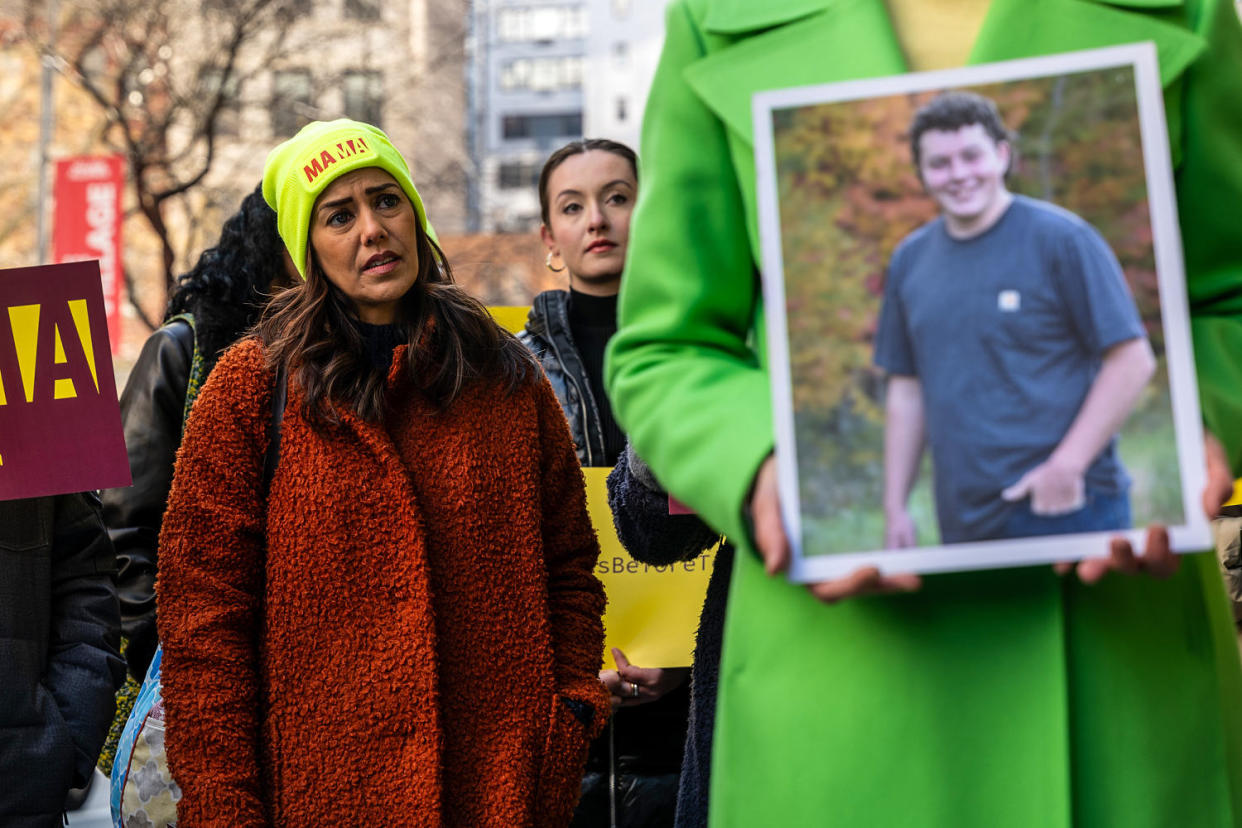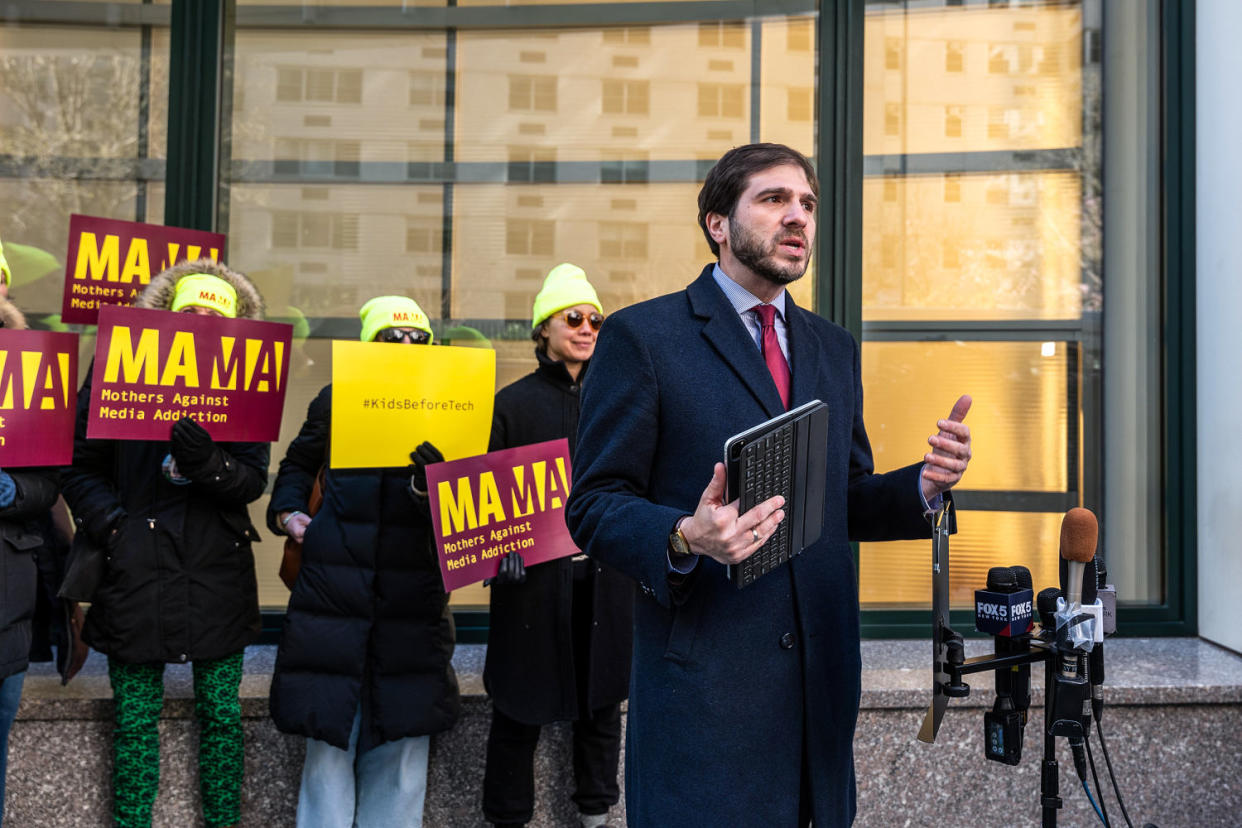Mothers' group protests in front of Meta’s offices, calling for big tech regulation
NEW YORK CITY — More than a dozen parents assembled in front of Meta’s lower Manhattan office on Friday morning, advocating for two New York Senate bills that would limit the ability of social media platforms to collect children’s social media data and algorithmically recommend content to them.
The group, founded and led by former New York Times journalist Julie Scelfo, is called MAMA — Mothers Against Media Addiction. They wore neon green beanies and held signs that said “#KidsBeforeTech.” Many of its members, some of whom lost children after being exposed to harms through social media, had demonstrated in January during the U.S. Senate hearings around Big Tech and child safety. During the hearing, Meta founder and CEO Mark Zuckerberg turned to them and said, “I’m sorry for everything you’ve all gone through.”
“He actually looked me in the eyes for a few minutes and I thought ‘You have no idea who I am,’” Scelfo told NBC News in an interview after the rally, referring to Zuckerberg’s acknowledgement of grieving parents during the Senate hearings. “And who I am is someone who has for years been asking people to think more critically about how all these technologies are wreaking havoc with basic institutions in our democracy.”
The issues discussed by parents and child safety advocates at the Friday rally extended far beyond the aims of the New York state bills, with actress and author Sheetal Sheth, a MAMA member and event speaker, calling them the “bare minimum” of regulating Big Tech.
One parent, Mary Rodee, was holding a picture of her late son Riley, who died by suicide at age 15 in 2021 after being targeted with online sextortion on Facebook, she said.

“Nothing has changed in nearly three years since Riley’s death,” Rodee said.
Meta referred NBC News to its participation with the “Take It Down” initiative, introduced in 2023 alongside the National Center for Missing & Exploited Children, which provides aid to children who are being sexually extorted or have had intimate material featuring them posted online. Meta also pointed to its guidance for kids and parents around sextortion, its stricter standards for minors on Facebook Messenger and its Safety Notices within Instagram direct messages.
The two New York Senate bills were introduced by state Sen. Andrew Gounardes, who spoke at the protest. The bills are still waiting to advance from Senate committee. One is called the “Stop Addictive Feeds Exploitation (SAFE) for Kids Act” and the other is called the New York child data protection act.

The “SAFE” act would require social media platforms to opt children out of algorithmic-driven feeds — which it calls “addictive” — and instead present chronological feeds of posts from accounts children follow, minus algorithm-suggested content. It would also prevent social media platforms from sending children notifications between midnight and 6 a.m. The New York child data protection act would prohibit online sites from “collecting, using, sharing, or otherwise processing any personal data of individuals under the age of 18 without informed consent.”
Both bills would limit how social media companies can administer their products to children in New York state, as well as how those companies can profit from child users. The “SAFE’’ act would require social media companies to “provide age verification methods all New Yorkers can use” that do not collect biometric data or require government identification “that many New Yorkers do not possess.” The child data protection act would not require age verification, but would instead require companies to rely on “browser or device signals” that indicate a user is a minor.
“This country is so far behind other countries in ensuring basic regulations,” Scelfo said, referring to various laws that have been passed in Europe regulating social media platforms.
In the U.S., various pieces of proposed regulation on social media companies have failed or languished in Congress.
MAMA and the New York state bills the group is advocating for are part of a movement of proposed and enacted social media regulation at the state level, where advocates of Big Tech regulation have seen more success. For example, in Florida, a controversial state bill that would ban social media for kids under 16 even if they had their parents’ permission passed the House in February. That bill contains similar language to the less restrictive New York bills, as well as similar proposals and laws in states like Arkansas, Texas, Ohio, New Jersey and California.
The Washington Post reported that MAMA is financially backed by the Center for Humane Technology nonprofit, which was behind the 2020 documentary “The Social Dilemma.” The nonprofit has also advocated for the Kids Online Safety Act, federal legislation that proposes new obligations for social media companies to prevent children from being exposed to content deemed harmful. Critics say this bill threatens kids’ First Amendment rights and puts the power to censor the internet in the hands of partisan state officials.
Big Tech companies and researchers have also challenged the idea that social media can be addictive, which is at the heart of the proposed “SAFE” act in New York City. While addiction is in MAMA’s name, Scelfo said the group isn’t making medical claims.
“I’m not a doctor, and MAMA is not using the word addiction in a clinical sense. However, we are using it to communicate the overarching problem in our society’s addiction to media and technology,” she said.
“We have screens everywhere now. And because of the internet and 24-hour, endless streams of content, we are inundating people’s minds and hearts with more information than they can possibly process. We have screens in elevators, we have screens in waiting rooms, in restaurants, at gas pumps, and it is not good for human health.”
